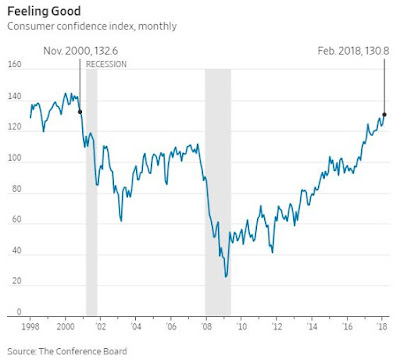JOBS
The U.S. economy is projected to add 11.5 million jobs over the next decade, with about one-third coming from the rapidly growing health care field, according to government estimates released Tuesday.*
CONSUMER SENTIMENT
The University of Michigan's mid-month report on consumer attitudes rose to 99.9 in February, its second-highest level since 2004. Reuters economists expected the reading to only reach 95.5.
The February number marks a 4.4 percent increase from the month-ago figure of 95.7. Consumers' expectations leaped even farther ahead, increasing 4.5 percent month-over-month in the most recent report.**
The number was hardly phased by the behavior of the stock market.CONSUMER CONFIDENCE In a different measure, Consumer confidence also boomed in February, again undeterred by the stock market behavior.
The Conference Board's measure of consumer attitudes on current and future economic conditions increased to 130.80 in February, up from 124.30 in January.
The newest reading is the index's highest since November 2000, when confidence peaked at 132.60.
.........................................................
"Overall, consumers remain quite confident that the economy will continue expanding at a strong pace in the months ahead."
Feelings about short-term economic prospects, in particular, shot back up in January after declining sharply the month before.***
See figure for history of Consumer Confidence (from an article by Eric Morath):***HOUSING STARTS
Though single-family home starts fell by 1.7% in January, the decline was more than made up for by an increase in multi-family homes of 26.5%.****
STOCK MARKET BEHAVIOR - SHORT- AND LONG-TERM.
One Year Presidential records: (https://www.equities.com/news/which-presidents-were-best-for-the-stock-market)
As it stands right now, President Trump has had the 3rd best one-year stock performance. In comparison, John Kennedy had the best one-year market and Jimmy Carter the worst. Over his full term (8 yrs), President Clinton an average 18.195% for the post-WW-II record for a total increase of the DJIA of 217.185. I must say that I view the 90s as the only decade in which I felt prosperous.
All-time Presidential records: Clinton only ranks #3 on the all-time record for average gain All-time, the record goes to Calvin Coolidge with an average gain of 30.336% for a total gain of 241.44 over his 6 years in office. He is followed by William McKinley with an average of 18.514% over 4 yrs. Clinton, however, ranks #1 over a full two terms as president.
Worst Presidential records
https://www.equities.com/news/which-presidents-were-the-worst-for-the-stock-market
Herbert Hoover is by far the worst President for one-term stock market behavior of -81.969%, but he is followed by George W. Bush (Bush 43) who had two terms with a declining average of -22.083% so he ranks #1 for two-term presidents.
* https://www.cnbc.com/2017/10/24/us-to-add-11-point-5-million-jobs-in-next-decade-due-to-health-care-bls.html
** https://www.cnbc.com/2018/02/16/february-consumer-sentiment.html
*** https://www.cnbc.com/2018/02/27/us-consumer-confidence-index-february-conference-board.html
https://www.wsj.com/articles/u-s-consumers-confidence-reaches-highest-level-since-2000-1519744556
**** https://www.cnbc.com/2018/02/16/us-housing-starts-jan-2018.html



